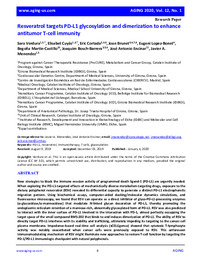Por favor, use este identificador para citar o enlazar este ítem:
https://hdl.handle.net/11000/30654Registro completo de metadatos
| Campo DC | Valor | Lengua/Idioma |
|---|---|---|
| dc.contributor.author | Verdura, Sara | - |
| dc.contributor.author | Cuyàs, Elisabet | - |
| dc.contributor.author | Cortada Almar, Eric | - |
| dc.contributor.author | Brunet, Joan | - |
| dc.contributor.author | López-Bonet, Eugeni | - |
| dc.contributor.author | Martín-Castillo, Begoña | - |
| dc.contributor.author | Bosch-Barrera, Joaquim | - |
| dc.contributor.author | Encinar, José Antonio | - |
| dc.contributor.author | MENÉNDEZ MENÉNDEZ, JAVIER ABEL | - |
| dc.contributor.other | Departamentos de la UMH::Bioquímica y Biología Molecular | es_ES |
| dc.date.accessioned | 2024-01-26T09:00:10Z | - |
| dc.date.available | 2024-01-26T09:00:10Z | - |
| dc.date.created | 2019-12-23 | - |
| dc.identifier.citation | AGING 2020, Vol. 12, No. 1 P. 8-34 | es_ES |
| dc.identifier.issn | 1945-4589 | - |
| dc.identifier.uri | https://hdl.handle.net/11000/30654 | - |
| dc.description.abstract | New strategies to block the immune evasion activity of programmed death ligand-1 (PD-L1) are urgently needed. When exploring the PD-L1-targeted effects of mechanistically diverse metabolism-targeting drugs, exposure to the dietary polyphenol resveratrol (RSV) revealed its differential capacity to generate a distinct PD-L1 electrophoretic migration pattern. Using biochemical assays, computer-aided docking/molecular dynamics simulations, and fluorescence microscopy, we found that RSV can operate as a direct inhibitor of glyco-PD-L1-processing enzymes (α-glucosidase/α-mannosidase) that modulate N-linked glycan decoration of PD-L1, thereby promoting the endoplasmic reticulum retention of a mannose-rich, abnormally glycosylated form of PD-L1. RSV was also predicted to interact with the inner surface of PD-L1 involved in the interaction with PD-1, almost perfectly occupying the target space of the small compound BMS-202 that binds to and induces dimerization of PD-L1. The ability of RSV to directly target PD-L1 interferes with its stability and trafficking, ultimately impeding its targeting to the cancer cell plasma membrane. Impedance-based real-time cell analysis (xCELLigence) showed that cytotoxic T-lymphocyte activity was notably exacerbated when cancer cells were previously exposed to RSV. This unforeseen immunomodulating mechanism of RSV might illuminate new approaches to restore T-cell function by targeting the PD-1/PD-L1 immunologic checkpoint with natural polyphenols. | es_ES |
| dc.format | application/pdf | es_ES |
| dc.format.extent | 27 | es_ES |
| dc.language.iso | eng | es_ES |
| dc.publisher | Impact Journals | es_ES |
| dc.rights | info:eu-repo/semantics/openAccess | es_ES |
| dc.rights | Attribution-NonCommercial-NoDerivatives 4.0 Internacional | * |
| dc.rights.uri | http://creativecommons.org/licenses/by-nc-nd/4.0/ | * |
| dc.subject | PD-L1 | es_ES |
| dc.subject | resveratrol | es_ES |
| dc.subject | immunotherapy | es_ES |
| dc.subject | T cells | es_ES |
| dc.subject | glycosylation | es_ES |
| dc.subject.classification | Bioquímica y Biología Molecular | es_ES |
| dc.subject.other | CDU::5 - Ciencias puras y naturales::57 - Biología::577 - Bioquímica. Biología molecular. Biofísica | es_ES |
| dc.title | Resveratrol targets PD-L1 glycosylation and dimerization to enhance antitumor T-cell immunity | es_ES |
| dc.type | info:eu-repo/semantics/article | es_ES |
| dc.relation.publisherversion | https://doi.org/10.18632/aging.102646 | es_ES |

Ver/Abrir:
10.18632_aging.102646 (1).pdf
4,83 MB
Adobe PDF
Compartir:
 La licencia se describe como: Atribución-NonComercial-NoDerivada 4.0 Internacional.
La licencia se describe como: Atribución-NonComercial-NoDerivada 4.0 Internacional.
.png)